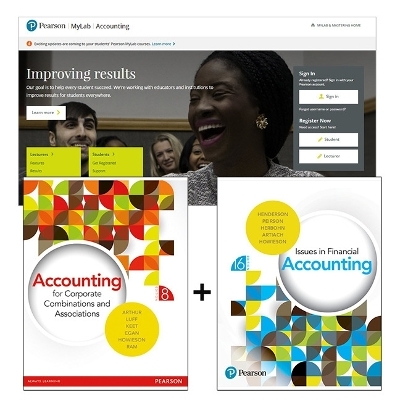
Issues in Financial Accounting + Accounting for Corporate Combinations and Associations + MyLab Accounting without Pearson eText
Pearson
978-1-4886-5833-4 (ISBN)
- Titel nicht im Sortiment
- Artikel merken
Updated to reflect changes to the Australian Accounting Standards Board (AASB) standards and interpretations (up to the end of September 2016), changes to this edition have focused on accounting content and updates.
Real world examples balanced with a breadth and depth of content ensures students develop a critical understanding of the topics in financial accounting.
Accounting for Corporate Combinations and Associations, is the latest update of this well-known and highly regarded text which provides clear, comprehensive and practical coverage of the process and issues relevant to consolidation accounting. This edition is a thorough update which reflects the significant changes to the Australian Accounting Standards, IFRS and Corporations Law that have occurred since the last publication.
While working with this text, students learn to explain, execute and evaluate the accounting methods used in consolidations. They will be well equipped to prepare accounts for larger entities, groups and joint ventures.
Accounting for Corporate Combinations and Associations is written for second and third year undergraduate Advanced Financial Accounting, Company Accounting and Consolidated Financial Reporting courses. It is also suitable for students undertaking professional accounting qualifying examinations (in particular the CPA Australia or CA programs).
Pearson MyLab is the world's leading online self-study, homework, tutorial and assessment product designed with a single purpose in mind: to improve the results of all higher education students, one student at a time.
To access the MyLab you need a Course ID from your instructor.
Samples Download the detailed table of contents >
Preview sample pages from Issues in Financial Accounting >
Preview sample pages from Accounting for Corporate Combinations and Associations >
SCOTT HENDERSON AM is Emeritus Professor in the Business School at the University of Adelaide. His PhD is from UCLA. He was previously Professor of Accounting at Monash University and has also taught at the University of Manitoba; University of California, Los Angeles; San Diego State University; and the University of Regina. He has previously been a National President of CPA Australia and a consultant to both the public and private sectors. He was also co-author of Issues in Financial Accounting and Financial Accounting Theory, and the author or co-author of more than 60 published papers. GRAHAM PEIRSON is an Emeritus Professor in the Department of Accounting and Finance at Monash University. He undertakes research in the area of financial accounting and reporting. In particular, he is interested in issues relating to accounting standard setting and the regulation of financial reporting. He was a member of the Accounting Standards Board of the Australian Accounting Research Foundation before the Board's merger with the Accounting Standards Review Board in 1988. From 1979 to 1989, he was a member of Council of the Victorian Division of CPA Australia, serving as President in 1985/86. He was the inaugural Chairman of CPA Australia's External Reporting Centre of Excellence and served on the CoE in that capacity until 1999. He was a member of the Public Sector Accounting Standards Board of the Australian Accounting Research Foundation from 1989 until it merged with the Australian Accounting Standards Board (AASB) in 2000. He was a member of the AASB from 2000 to 2002. Business finance is also an area in which he has an interest, as evidenced by his co-authorship of Essentials of Business Finance, Business Finance and Financial Accounting Theory, and Financial Accounting: An Introduction. In addition, he has published widely in journals in Australia and overseas. He is the former Director of the Department's Centre for Research in Accounting and Finance. KATHY HERBOHN is an Associate Professor in financial accounting in the UQ Business School at the University of Queensland. She has taught at Australian universities for over 20 years in both undergraduate and postgraduate courses. Kath has a PhD in Financial Accounting from the University of Adelaide and her main research interest is the consequences of accounting regulation for financial statement users and preparers, with a particular focus on income tax and carbon emissions. Her publications appear in various journals, including Accounting, Organisations and Society, Journal of Business Finance and Accounting, Journal of Business Ethics, British Accounting Review, Accounting and Finance, and Australian Accounting Review. TRACY ARTIACH is a Senior Lecturer in financial accounting in the UQ Business School at the University of Queensland. She has taught at Australian universities for over 20 years in undergraduate, postgraduate and MBA courses covering on-campus, distance and online delivery modes. In 2009, Tracy received the UQ Business School Postgraduate Teaching Award and in 2014 was ranked 5th in the Unijobs Top 10 QUT Lecturers. Tracy has a PhD from the University of Queensland with research publications in Australian and international academic journals including Accounting, Auditing and Accountability Journal, Energy Economics, Australian Journal of Management, Accounting and Finance and Australian Accounting Review. Tracy's teaching and research interests are in the area of financial reporting and accounting standard, including issues relating to disclosure, conservatism, comprehensive income and measurement. She is actively involved in the Accounting and Finance Association of Australia and New Zealand (AFAANZ) Accounting Standards Special Interest Group (SIG 3) and serves on the committee of the SIG. NEAL ARTHUR BEc (USyd), MCom (Hons) (UNSW), PhD (USyd), CA, is a senior lecturer in the Business School at the University of Sydney. Neal's current research areas are financial reporting and corporate governance. He has contributed articles to the Australian Journal of Management, Australian Accounting Review, Charter, Accounting and Finance, Corporate Governance and the Journal of Corporate Finance. Neal has also been a co-author of previous editions of Accounting for Corporate Combinations and Associations. He has previously held visiting positions overseas, including the University of Michigan and the University of Texas. Prior to entering academia, Neal was employed at Deloitte. MATTHEW EGAN is a Senior Lecturer within the Discipline of Accounting at the University of Sydney. His research interests includes the emergence of organisational strategies focused on 'sustainability' and understanding how that impacts on management practice, accounting routines, and other organisational behaviours. Matthew has worked as a finance manager, company secretary, external auditor and internal auditor including experience within a medium-sized publicly listed entity and over seven years' experience in two chartered accounting firms in Australia and Solomon Islands. BRYAN HOWIESON M.Com. FCPA FAFAANZ is Associate Professor in the School of Accounting and Finance at the University of Adelaide. He has held prior positions at the Adelaide Graduate School of Business and the Universities of South Australia and Western Australia. His teaching and research interests relate primarily to financial reporting and accounting standard setting but he also has strong interests in accounting education, professional ethics and corporate governance. Bryan has published extensively in academic and professional journals. Bryan has served as a director of several not-for-profit entities including as President (Australia) of the Accounting and Finance Association of Australia and New Zealand and as Vice-President on the Executive Committee of the International Association for Accounting Education and Research. Bryan was a member of CPA Australia's 'Member of the Future' committee, is a Past-President of the South Australian Division of CPA Australia, and now serves on CPA Australia's Professional Qualifications Advisory Committee. PETER KEET has been a lecturer in accounting at the School of Accounting at RMIT University since 2002. Peter specialises in teaching courses based on accounting standards to both undergraduate and post-graduate Masters students. Prior to teaching at RMIT University, Peter taught financial accounting for 20 years at various other Victorian Universities. Peter has also taught business finance and auditing. Peter has also been actively involved in the financial accounting modules of the CPA Program for 10 years. Peter has acted as Treasurer for a number of community, non-profit organisations. LOUISE LUFF BBus (UTS), CA, VITAL, is a casual lecturer in the School of Accounting at the University of Sydney and Master of Accounting Program at Macquarie University. Louise has had significant accounting and management experience in both professional and commercial organisations, including the role of an accounting technical manager for a large Australian financial institution. She has written materials for the Institute of Chartered Accountants in Australia CA and Quality Assurance programs. She has also written study materials for the Atax program at the University of New South Wales. RONITA RAM joined Henley Business School at the University of Reading as a lecturer in Accounting in 2015. She has a PhD in Accounting from the University of Sydney, a Post graduate Diploma in Accounting and a Bachelor of Arts degree in Accounting and Information System.
Issues in Financial Accounting
Part 1 Institutional setting and the conceptual framework
Chapter 1 Institutional arrangements for setting accounting standards in Australia
Chapter 2 The conceptual framework: Purpose, reporting entity, the objective of financial reporting, and qualitative characteristics
Chapter 3 The conceptual framework: Definition, recognition and measurement of the elements in general purpose financial statements
Chapter 4 Fair value measurement
Chapter 5 The choice of accounting methods
Part 2 The statement of financial position
Chapter 6 The statement of financial position: An overview
Chapter 7 Accounting for current assets
Chapter 8 Accounting for property, plant and equipment
Chapter 9 Accounting for company income tax
Chapter 10 Accounting for intangible assets
Chapter 11 Accounting for leases
Chapter 12 Accounting for employee benefits
Chapter 13 Accounting for financial instruments
Part 3 The statement of comprehensive income and further financial reporting issues
Chapter 14 The statement of comprehensive income
Chapter 15 Revenue
Chapter 16 The statement of cash flows
Chapter 17 Financial reporting: Segment reporting and highlights statements
Chapter 18 Further financial reporting issues
Part 4 Industry accounting standards
Chapter 19 Accounting for the extractive industries
Chapter 20 Accounting for agricultural activity
Chapter 21 Accounting for superannuation entities
Chapter 22 Accounting for insurance
Part 5 International accounting
Chapter 23 International accounting standards, harmonisation and convergence
Chapter 24 Foreign currency translation
Part 6 Accounting and the community
Chapter 25 Accounting for corporate social responsibilities
Chapter 26 Ethics in accounting
Download the detailed table of contents >
Accounting for Corporate Combinations and Associations
Ch 1. Text objectives and introduction to consolidation
Ch 2. Principles of consolidation
Ch 3. Fair value adjustments and tax effects
Ch 4. Intra-group transactions
Ch 5. Non-controlling interest
Ch 6. Partly-owned subsidiaries: indirect non-controlling interest
Ch 7. Consolidated cash flow statements
Ch 8. Accounting for joint arrangements
Ch 9. Accounting for associates and joint ventures: the equity method
Ch 10. Translation and consolidation of foreign currency financial statements
Ch 11. Segment reporting by diversified entities
Download the detailed table of contents >
| Erscheint lt. Verlag | 6.4.2020 |
|---|---|
| Sprache | englisch |
| Maße | 228 x 278 mm |
| Gewicht | 3378 g |
| Themenwelt | Naturwissenschaften ► Biologie ► Genetik / Molekularbiologie |
| Wirtschaft ► Betriebswirtschaft / Management ► Rechnungswesen / Bilanzen | |
| Wirtschaft ► Betriebswirtschaft / Management ► Wirtschaftsinformatik | |
| ISBN-10 | 1-4886-5833-1 / 1488658331 |
| ISBN-13 | 978-1-4886-5833-4 / 9781488658334 |
| Zustand | Neuware |
| Haben Sie eine Frage zum Produkt? |
aus dem Bereich


